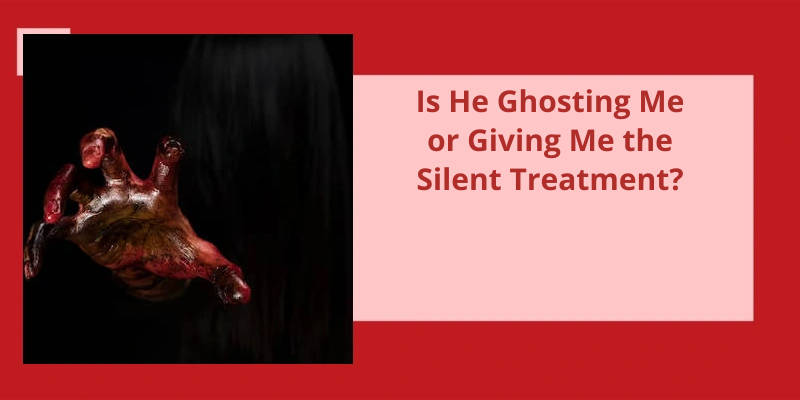When it comes to deciphering the complex world of relationships, one of the most perplexing situations one can find themselves in is the dilemma of whether their partner is merely giving them the silent treatment or if they’ve fallen victim to the increasingly common act of ghosting. While the silent treatment entails enduring a period of frigid silence and emotional detachment that can last anywhere from hours to weeks, ghosting takes things to an entirely new level. In the realm of ghosting, a person abruptly and completely severs all lines of communication, vanishing from the relationship and leaving their partner questioning their very existence in their shared life. The confusion and emotional turmoil that can result from such situations can be overwhelming, prompting a desperate search for answers and clarity. So, how can one discern whether they’re being subjected to the silent treatment or if they’ve indeed been ghosted? Read on to unravel the mysteries behind these contrasting forms of relationship abandonment.
What Is Silent Ghosting?
What’s silent ghosting? While regular silent treatment in a relationship may mean suffering the partners cold, icy silence for a couple of hours to several days or even to a few weeks, ghosting means that a person completely and suddenly stops communicating and vanishes from the relationship – and out of the shared life.
Ghosting can feel even more painful than silent treatment because it implies a permanent disconnection with no explanation or closure. It leaves the other person feeling confused, hurt, and abandoned. Is he ghosting me or giving me the silent treatment? This question often arises when a partner suddenly withdraws without any apparent reason or explanation. It’s a confusing and frustrating experience that can lead to a lot of self-doubt and insecurity.
The key difference between ghosting and silent treatment lies in the intention behind the behavior. In both cases, the person being ignored or avoided is left feeling rejected and discarded.
The reasons behind ghosting can vary, but they often include a lack of emotional maturity, fear of confrontation, or the desire to avoid any uncomfortable conversations. It can also be a sign of deeper issues within the relationship, such as a loss of interest or the presence of unresolved conflicts.
It’s possible that they may not even be aware of the impact their behavior is having on you. Having an open and honest conversation about your needs and expectations can help you determine whether the relationship is salvageable or if it’s time to move on.
Signs That Someone May Be Considering Ghosting You
There are several signs that someone may be considering ghosting you, which is when they suddenly stop responding to your messages and disappear without any explanation. These signs can include a decrease in communication frequency, vague or short responses, canceled plans, and a lack of interest in making future plans. Additionally, if they’ve been active on social media but ignore your messages, it could be a red flag. While it can be difficult to determine whether someone is giving you the silent treatment or ghosting you, it’s important to communicate openly and honestly with the person to address any concerns or issues.
When it comes to interpersonal communication, there’s a distinction between ignoring and ghosting. Ignoring implies that there’s a chance the person may eventually respond or reconcile, whereas ghosting suggests a more definitive and prolonged absence from one’s life. Understanding this distinction can help in navigating different scenarios and managing expectations.
What Is the Difference Between Ignoring and Ghosting?
When it comes to being ignored versus being ghosted, there’s a subtle but important distinction between the two. Ignoring suggests that there’s still a possibility for the person to reconnect with you, while ghosting implies a more definitive and permanent abandonment. If someone is ignoring you, there’s still a glimmer of hope that they might come around and reestablish communication. They may simply be preoccupied with other things in their life or going through a difficult time that’s causing them to withdraw. In such cases, it’s often a matter of giving them the space and time they need to sort things out.
Ghosting usually involves a sudden and complete disappearance without any explanation or closure. It can leave you feeling confused, hurt, and wondering what went wrong. This behavior is often a sign that the person has made a conscious decision to remove themselves from your life, either temporarily or permanently.
It’s important to set boundaries and prioritize your own well-being when faced with someone who’s ignoring or ghosting you. While it’s human nature to want answers and closure, it isn’t always possible to obtain them. It’s essential to focus on your own personal growth and surround yourself with people who treat you with respect and communicate openly. Remember that being ignored or ghosted by someone doesn’t diminish your worth and value as an individual.
The Role of Technology and Social Media in Facilitating Ignoring and Ghosting Behavior
- Technology and social media have played a significant role in enabling ignoring and ghosting behavior.
- Easy accessibility to various communication platforms has made it convenient for individuals to avoid or ignore social interactions.
- Social media platforms like Facebook, Instagram, and Twitter provide methods to disconnect or block individuals, making it easier to ignore or ghost someone.
- The impersonal nature of online communication allows individuals to detach themselves emotionally and avoid confrontation.
- Instant messaging and texting have contributed to the rise of ghosting, as individuals can easily stop responding without any explanation.
- Dating apps and online platforms have normalized ghosting behavior in relationships, as it’s relatively effortless to cut off communication without consequences.
- Technology also provides a sense of anonymity, which encourages individuals to engage in ignoring or ghosting behavior without feeling accountable.
- The fear of confrontation and the desire for control over social interactions have been amplified by technology, making it easier to avoid uncomfortable conversations.
- While technology and social media have their benefits, it’s essential to promote empathy and establish healthy communication norms to address the negative impact of ignoring and ghosting behavior.
There’s an ongoing debate on whether ghosting is equivalent to the silent treatment. According to Dr Anders, a renowned psychologist, ghosting, stonewalling, and ignoring someone can be categorized as a type of emotional abuse, despite some individuals not fully grasping it’s impact. By exploring the connection between ghosting and the silent treatment, we can better understand the potential harm such actions can inflict.
Is Ghosting a Form of Silent Treatment?
Many individuals find themselves in a perplexing situation when faced with the question: “Is he ghosting me or giving me the silent treatment?”. It’s essential to understand that ghosting and the silent treatment are distinct yet interconnected phenomena. Dr Anders, a renowned psychologist, suggests that people often fail to acknowledge the fact that ghosting can indeed be considered a form of silent treatment. In fact, he contends that both behaviors, whether intentional or subconscious, can be indicators of emotional abuse.
Ghosting, for those unfamiliar, refers to abruptly cutting off all communication with someone without any explanation or closure. This act can leave the recipient confused, hurt, and rejected. Similarly, the silent treatment involves purposely ignoring someone, refusing to engage in conversation, or giving limited, monosyllabic responses.
While people may resort to ghosting or the silent treatment as a defense mechanism or to avoid confrontation, it’s crucial to recognize the impact such actions can have on another person. Unfortunately, in todays digital era, ghosting has become increasingly prevalent, primarily due to the ease of avoiding communication through various technological platforms. However, it’s essential to condemn these behaviors and promote open communication and empathy instead.
Both acts involve withholding communication, ultimately causing emotional harm to the recipient. Dr Anders highlights the significance of recognizing these behaviors as forms of emotional abuse, as they can deeply affect an individuals mental well-being. Promoting healthy communication, empathy, and respect is crucial in fostering healthy relationships and preventing the perpetuation of such emotionally harmful behaviors.
Source: Have you ghosted someone? Say these 4 things instead of …
Communication is vital in maintaining healthy relationships, but what happens when someone starts giving you the silent treatment? If you’ve noticed a sudden change in someone’s behavior and they’ve become unusually silent, it may be worth investigating whether this is part of a larger pattern. Taking some time to reflect on the potential causes behind their silence can help you approach the situation with honesty, openness, and calmness when you decide to confront them.
Should You Confront Someone Giving You the Silent Treatment?
Should you confront someone giving you the silent treatment? It’s essential to approach the situation with sensitivity and understanding. If youve noticed a sudden change in someones behavior, particularly if they were previously communicative, it’s natural to feel concerned and wonder if youve done something wrong. Before jumping to conclusions, take some time to reflect on the potential reasons behind their silence. Is there a possibility that theyre facing personal challenges or feeling overwhelmed? Understanding their perspective may help you navigate the confrontation more effectively.
When engaging in this conversation, remember that it’s crucial to listen attentively and with empathy. Give the person an opportunity to explain their side, as there may be underlying issues that they’re struggling with, and they may have difficulty expressing themselves. By genuinely listening to their concerns, you can work towards resolving any misunderstandings or conflicts that may have contributed to their silence.
It’s also essential to set healthy boundaries and communicate your expectations moving forward. Express how their silence has affected you and emphasize the importance of open and honest communication in your relationship. Encourage them to share their thoughts and feelings more openly and let them know that you’re there to support them.
However, it’s vital to recognize when the silent treatment might be part of a recurring pattern of unhealthy behavior, manipulation, or emotional abuse. If you’ve repeatedly confronted someone about their silent treatment and it continues without any effort to improve, it may be necessary to evaluate the overall health of the relationship and consider seeking guidance from a trusted friend, therapist, or counselor.
How to Rebuild Trust After Experiencing the Silent Treatment
- Open communication: Initiate a calm and non-confrontational conversation to express your concerns about the silent treatment and the impact it’s on your relationship.
- Active listening: Provide your partner with a safe space to share their perspective and truly listen to their feelings and concerns without interrupting or getting defensive.
- Acknowledge the pain: Validate each other’s emotions and acknowledge the hurt caused by the silent treatment, emphasizing the importance of addressing the issue together.
- Recognize patterns: Identify any recurring triggers or situations that lead to the silent treatment, and work together to find healthier ways to address conflicts or disagreements.
- Establish boundaries: Discuss and agree on boundaries for communication, ensuring that both partners feel comfortable expressing themselves without resorting to silence or avoidance.
- Practice empathy: Cultivate empathy by putting yourself in your partner’s shoes and trying to understand their perspective, which can facilitate a deeper understanding and connection between you both.
- Apologize and forgive: If you were the one who used the silent treatment, take responsibility for your actions, sincerely apologize, and work on rebuilding trust. If you were on the receiving end, allow yourself to forgive and let go of any resentment or anger.
- Seek professional help: If the silent treatment persists or if trust issues remain unresolved, consider seeking the guidance of a couples therapist or counselor who can provide techniques and support to rebuild trust in your relationship.
Getting the silent treatment from a man can be a deeply distressing experience, as it’s often a tactic used to assert dominance or control in a relationship. Those who employ this method may do so as a means of putting their partner in their supposed place. This might take the form of withholding communication for extended periods, ranging from days to even weeks. During this time, they may refuse to engage in conversation, maintain eye contact, or respond to any form of communication, be it calls, texts, or messages.
What Does It Mean When a Man Gives You the Silent Treatment?
When a man gives you the silent treatment, it can be an extremely frustrating and confusing experience. It often leaves you questioning what went wrong and why he’s behaving this way. The silent treatment can have different meanings depending on the context and dynamics of your relationship.
One possible explanation is that he’s using the silent treatment as a way to gain power or exert control over you. By withholding communication and refusing to engage with you, he’s putting you in your place and asserting dominance. This manipulative tactic aims to make you feel powerless and uncertain about the relationship.
Another reason for the silent treatment could be that he’s intentionally giving you the cold shoulder for an extended period of time. Instead of addressing the issue at hand, he chooses to ignore you completely. Days or even weeks may pass without any communication from him, leaving you feeling isolated and alone in the relationship.
Refusing to talk, make eye contact, answer calls, or respond to texts are all clear signs of someone using the silent treatment. This deliberate withdrawal of communication is a way for him to control and manipulate you. It’s an emotionally abusive behavior that can leave you feeling distressed, anxious, and desperate for answers.
It’s important to communicate openly and honestly with your partner, and to address issues as they arise. If your partner continues to use the silent treatment as a form of control, it may be necessary to reevaluate the dynamics of the relationship and prioritize your own well-being.
Recognizing when someone is giving you the silent treatment can be a challenging ordeal. It becomes evident when they deliberately choose to disregard your presence and consistently ignore your attempts to engage with them. Often extending for prolonged periods, this silence becomes even more perplexing as there’s no telling when it will finally break. Curiously, they seem to find solace in conversing with others, yet maintain a complete avoidance of any dialogue with you.
How Do You Know if Someone Is Giving Silent Treatment?
It can be incredibly frustrating and demoralizing when someone you care about suddenly starts giving you the silent treatment. This passive-aggressive behavior can leave you feeling confused, hurt, and questioning what went wrong. So, how do you know if someone is intentionally ignoring you or giving you the silent treatment?
One telltale sign is when they blatantly and frequently ignore you. You may notice that they consistently fail to respond to your messages or calls, even when they were previously communicative. They might even go as far as avoiding you in person, refusing to acknowledge your presence or engage in conversation.
Another characteristic of the silent treatment is the prolonged periods of silence that you experience. Unlike a temporary break or a cooling-off period in a relationship, the silent treatment can stretch on for days, weeks, or even longer. This extended silence can be incredibly distressing, as you never know when it will end or if any resolution is possible.
Another sign to look out for is when you notice that theyre still engaging with others but specifically excluding you. You might observe them talking and interacting with mutual friends, family members, or colleagues, but when it comes to communicating with you, they maintain their silence. This selective behavior further solidifies the notion that they’re intentionally giving you the silent treatment.
Additionally, pay attention to any sudden shifts in their behavior or communication patterns. If they were previously open and communicative with you but have now become distant and unresponsive, it can indicate that they’re employing the silent treatment as a tactic to exert control or manipulate the situation.
Ultimately, dealing with someone who’s giving you the silent treatment can be emotionally draining and challenging. It’s important to remember that this behavior is a reflection of their own issues and not a reflection of your worth or value as a person. It may be necessary to have an honest and open conversation with them about their behavior if you hope to find resolution or understanding.
Conclusion
The absence of communication and the vanishing act can be extremely hurtful and confusing, leaving the other person feeling abandoned and rejected. Whether it's ghosting or the silent treatment, it’s important to recognize that these behaviors aren’t healthy or respectful in any relationship. Open and honest communication is crucial for building and maintaining a strong and supportive connection with your partner.






